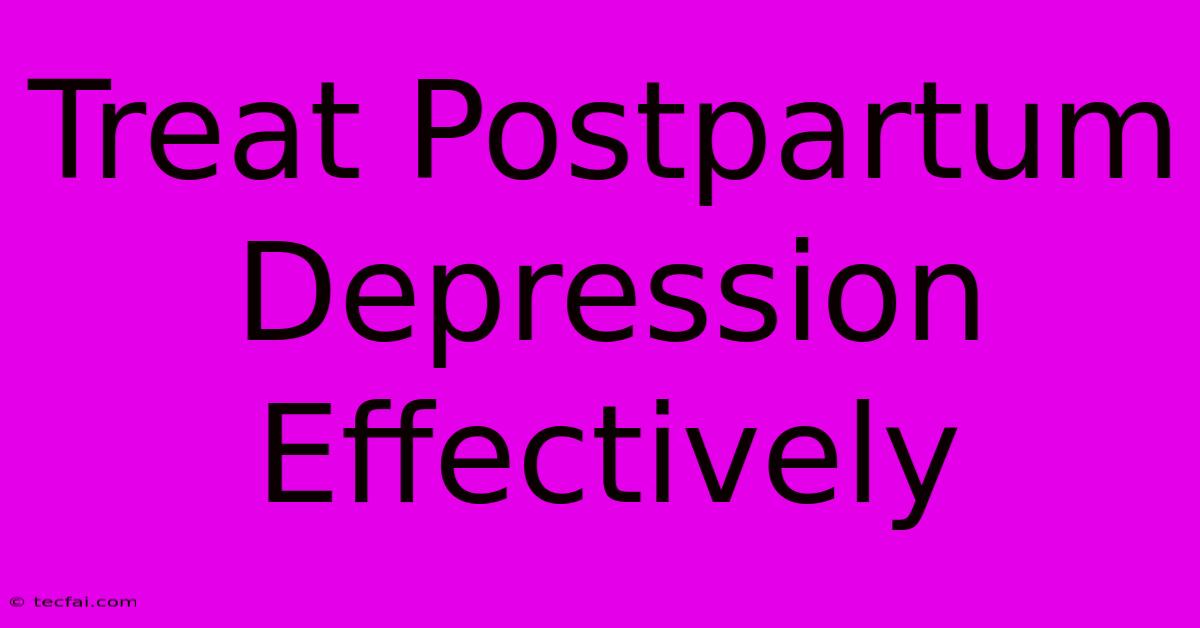Treat Postpartum Depression Effectively

Discover more detailed and exciting information on our website. Click the link below to start your adventure: Visit Best Website tecfai.com. Don't miss out!
Table of Contents
Treat Postpartum Depression Effectively: A Holistic Guide for New Mothers
Postpartum depression (PPD) is a serious condition affecting many new mothers. It's crucial to understand that PPD is not just "baby blues." While fleeting sadness is common after childbirth, PPD is a persistent and debilitating illness requiring professional intervention. This comprehensive guide explores effective treatment strategies for postpartum depression, emphasizing a holistic approach that combines medical, therapeutic, and self-care elements.
Understanding Postpartum Depression: Symptoms and Diagnosis
Before delving into treatment, it's essential to recognize the signs of PPD. Symptoms can vary but often include:
- Persistent sadness or low mood: This goes beyond the usual emotional fluctuations expected after childbirth.
- Loss of interest or pleasure: Activities once enjoyed now feel unappealing.
- Changes in appetite or sleep: Insomnia, oversleeping, or significant changes in eating habits are common.
- Fatigue and low energy: Feeling perpetually exhausted, even after adequate rest.
- Feelings of worthlessness or guilt: Excessive self-criticism and feelings of inadequacy.
- Difficulty concentrating or making decisions: Struggling with even simple tasks.
- Thoughts of self-harm or harming the baby: This is a serious symptom requiring immediate professional help.
A proper diagnosis is crucial. A healthcare professional, such as a doctor, psychiatrist, or psychologist, will assess your symptoms, medical history, and family history to determine if you have PPD. They may also consider other factors such as anxiety and other mental health conditions that can co-occur with PPD.
Effective Treatment Strategies for Postpartum Depression
Treatment for PPD usually involves a multi-faceted approach, combining different strategies to achieve optimal results.
1. Medication: A Cornerstone of Treatment
In many cases, medication is an essential component of PPD treatment. Antidepressants, such as selective serotonin reuptake inhibitors (SSRIs) or serotonin-norepinephrine reuptake inhibitors (SNRIs), are commonly prescribed. It's crucial to work closely with your doctor to find the right medication and dosage, as it may take time to find what works best for you. Remember to discuss breastfeeding concerns with your doctor before starting any medication.
2. Psychotherapy: Talking it Through
Therapy provides a safe and supportive space to process your emotions and develop coping mechanisms. Cognitive Behavioral Therapy (CBT) and interpersonal therapy are effective treatments for PPD. These therapies help identify and challenge negative thought patterns and improve interpersonal relationships.
3. Support Groups: Finding Community
Connecting with other mothers experiencing similar challenges can be incredibly beneficial. Support groups offer a sense of community, validation, and practical advice. Sharing your experiences with others who understand can significantly reduce feelings of isolation and loneliness.
4. Lifestyle Changes: Holistic Self-Care
While not a replacement for professional treatment, lifestyle adjustments can complement other therapies and improve overall well-being. These include:
- Regular Exercise: Even moderate physical activity can boost mood and energy levels.
- Healthy Diet: Nourishing your body with a balanced diet supports both physical and mental health.
- Adequate Sleep: Prioritize sleep as much as possible, even if it requires seeking help with childcare.
- Mindfulness and Relaxation Techniques: Practices like meditation or yoga can help manage stress and anxiety.
- Spending Time Outdoors: Exposure to sunlight can have a positive impact on mood.
5. Seeking Help: Reaching Out for Support
Don't hesitate to seek professional help. If you are experiencing symptoms of postpartum depression, please reach out to your doctor, therapist, or a trusted mental health professional. Early intervention is key to effective treatment and recovery. There's no shame in seeking support; it's a sign of strength.
Conclusion: Hope and Recovery are Possible
Postpartum depression is a treatable condition. By combining professional medical and therapeutic interventions with self-care strategies, you can effectively manage your symptoms and embark on a path towards recovery. Remember, you are not alone, and help is available. Seeking help is the most important step you can take toward regaining your well-being and enjoying motherhood.

Thank you for visiting our website wich cover about Treat Postpartum Depression Effectively. We hope the information provided has been useful to you. Feel free to contact us if you have any questions or need further assistance. See you next time and dont miss to bookmark.
Featured Posts
-
New Government Faces Hospital Crisis
Dec 03, 2024
-
Antiviral Coatings Market Analysis 2033
Dec 03, 2024
-
New Youth Strategy Funding Disagreement
Dec 03, 2024
-
Price May Skip Premier League Darts
Dec 03, 2024
-
Antimicrobial Coatings Market Growth To 2032
Dec 03, 2024
